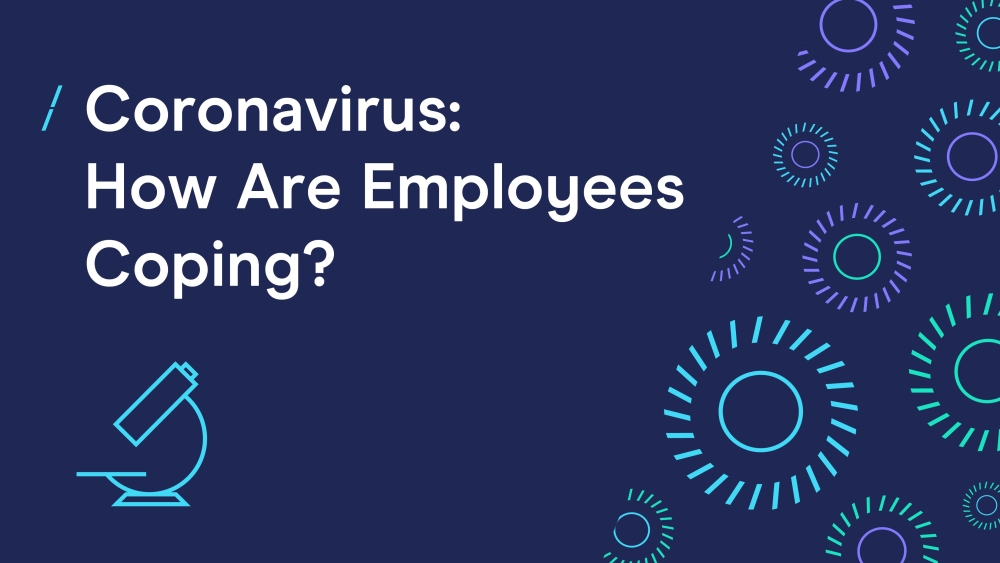Coronavirus: How Are Employees Coping?
03 Apr 2020

By now we all know that coronavirus is a global pandemic and several countries across the whole globe have declared the state of emergency.
Companies are either prohibited from having employees work at common facilities or are choosing to do this for safety. Those doing so are aiming to reduce the rate of spread and give medical facilities the breathing room to respond effectively.
Forrester, with the panel survey ‘Forrester’s Q1 2020 PandemicEX’ is currently investigating how US workers feel and how coronavirus is affecting their work lives.
Following we’ll report the data Forrester obtained after the first two survey waves:
- The first one launched on 3rd and closed on 6th March obtaining 470 responses among working adults
- The second one launched on 17th and closed on 19th March obtaining 504 responses among adults working part- or full-time
A third wave has been launched last week in five European countries and in three Asia-Pacifc regions. We’ll write a new article next week as soon as data will be available making results comparable across time and regions.
How do you feel?
Going back to a month ago, two third of people (67%) declared to stay informed about the coronavirus situation, about half (53%) were feeling afraid of the virus spread, 45% were expecting their work life to be disrupted by the pandemic and 29% were afraid to go to work due to the exposure risk.
As we can see, fear was already high during this first week. However, data shows a strong increase in the general level of concern among US workers two weeks later. Indeed, during the second wave, 72% were expecting their work life to be disrupted by coronavirus and 41% of respondents were feeling afraid to go to work due to the exposure risk. Moreover, 77% of respondents were regularly reading news on the pandemic, 59% were afraid of the virus spread.
How do you perceive your company?
Thanks to the data comparison between the first and the second wave, it’s possible to see that employees trust in their companies is going in the right direction.
Indeed, in the second wave, 20% more of respondents said to feel confident about their company’s plan to manage the risk associated with coronavirus (63% vs 43%).
More importantly, a further 10% of US workers felt their health and wellbeing was their company’s priority when making decisions about the risk of coronavirus (65% vs 55%).
Furthermore, two third (60% vs 48%) declared that they felt confident about their CEO/head of as the person in charge to handle the coronavirus situation in the best way possible, a clear indicator that leadership has stepped up during this crisis.
What are the actions your company has taken so far?
In terms of specific actions taken by businesses, data also reveals optimal improvements – please while reading this section bear in mind that in many locations’ restrictions weren’t yet mandatory.
66% of respondents, against 46% two weeks earlier, said that their companies have provided hygiene-related resources (hand sanitiser, facemask, etc.) to employees who must be at work.
The percentage of those saying their businesses cancelled/restricted travel to reduce exposure to the virus has doubled, from 32% to 66%.
Finally, compared to 26%, in the second wave 58% of respondents said that their companies asked workers to work from home more than usual.
How is working from home?
Working from home is now the norm, but is everyone happy with this change? Is everyone able to do it or be good at it?
30% of the respondents said it wasn’t the first time for them but 40% stated that their job cannot be done from home or a remote location. However, for those who can, the survey captured working from home as the employees’ new preference (52%) – information that businesses will have to consider when the pandemic will be over.
However, there are also individuals that admitted struggling with this new modality, considering themselves less productive (41%) which isn’t a synonym of ‘laziness’ rather a way to say, ‘I find this hard’. Many the possible reasons behind this answer, such as their home environment or technology issues: indeed, just above half (56%) said that their company owns the technology to allow them to work remotely. Moreover, the fact that many schools have closed in most regions brought 37% of US workers to declare having a hard time in managing their family/childcare responsibilities.
Finally, 42% are willing to go back to their offices as soon as the coronavirus situation will clear out.
What’s next?
We’re all imagining the future and right now the level of uncertainties we have to include in that picture might spark anxiety. Indeed, 33% of respondents said they are worried about their job security, with the possibility of being laid off by their own company. Furthermore, 31% showed their concern about the ability of their company to financially copy with the whole coronavirus situation.
Given the times we are living in, it’s every business responsibility to understand what the emotional journey of the employee pandemic experience feels like and how this affects their productivity and quality of work. Only after this analysis leaders will be able to identify the best tools to guide and motivate their employees out of this challenging time.
For daily updates on coronavirus visit: https://www.who.int/emergencies/diseases/novel-coronavirus-2019/situation-reports
The DMA has gathered information from the Government alongside advice from our partner organisations to help with the running of your business throughout the ongoing coronavirus situation.
Visit our Coronavirus: Advice and Help page, you will be able to access a list of all the measures announced by the Government to aid the economy during the outbreak.



1.png)
Please login to comment.
Comments